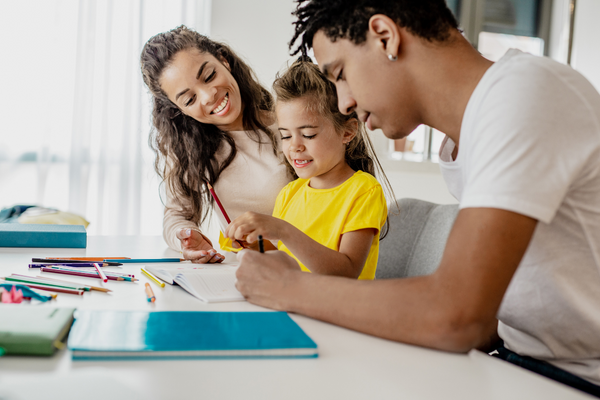With new teachers, new goals, new challenges, and a new routine to return to after weeks at home, it’s normal for your family to feel apprehensive or even worried about what the future holds.
For your special needs child to enjoy a seamless return to the classroom and be as successful as they can, it’s a good idea to prepare beforehand. Here are some of the steps we recommend to make it easier for your kids to head back to school.
Communicate with your child
Start by opening up the conversation about returning to school at least three weeks before they return.
 Mention the upcoming date, then talk about what they can expect and what they have to look forward to. This will help them prepare mentally for the transition and can help reduce those back-to-school jitters.
Mention the upcoming date, then talk about what they can expect and what they have to look forward to. This will help them prepare mentally for the transition and can help reduce those back-to-school jitters.
If they have any questions, answer them as honestly as you can and point out their school support system wherever possible. If they are moving grades or starting a new school, arrange a tour to get them familiar with their new surroundings and explain where they can find everything they need.
You can also consider creating a visual reference by handing a calendar somewhere prominent and adding important dates for the family including the return to school date, special events, family birthdays, and so on. As the day grows closer, you can mark off the days so they can understand the passage of time.
Get back into a sleep schedule
Your child’s sleep patterns are almost certain to have changed over the summer as you went on vacation, enjoyed family outings, and let them stay up or sleep in longer.
If you want to make the ‘wake-up and get ready for school’ experience easier for everyone, start to shift their sleep schedule as soon as possible. Otherwise, you could struggle with stress, confrontation, and grouchy, grumpy kids.
Go easy, changing their sleep patterns by 15 minutes at a time until they are back on track and feeling positive, and waking up at the ideal time.
Get organized
A week or two before term starts, find time to get all the back-to-school supplies they need like a new backpack, stationery, lunch box, small bag for ‘emergencies’, and perhaps a fidget spinner or other toy.
Turn this into a positive and exciting event (even if you’re feeling overwhelmed) and you can both spark their enthusiasm and ensure there’s no last-minute scrabbling around.
.png?width=600&name=Blog%20images%20BTS%202022%20(1).png) As a parent of a special needs child, you’ll also have to deal with more meetings, paperwork and documentation than most, so get on top of it early. Get hold of a folder and put it all together so you can find what you need when you need it, and better support your child.
As a parent of a special needs child, you’ll also have to deal with more meetings, paperwork and documentation than most, so get on top of it early. Get hold of a folder and put it all together so you can find what you need when you need it, and better support your child.
Review your child's IEP
When you have a child with special needs, you’re likely to have an IEP (Individualised Education Program) to ensure your child receives the support they need to thrive at school. Make sure you check this before they go back to school, reviewing what it contains, when it expires and whether it’s still relevant.
But don’t only rely on this! Also create a one-to-three-page document outlining a child’s likes and dislikes, how you’re dealing with anxiety or other challenges at home, what triggers and what calms them plus information about any food allergies, medication, and emergency contact numbers.
This extra information always helps, especially if your child is meeting a new teacher, joining a new class, or starting a new school.
Brush up on study skills
After weeks away from the classroom, your child is likely to have forgotten key facts, figures, and information they learned and will struggle more with focus and memory. Give them a gentle prod in the right direction by getting them off their screens and incorporating fun activities into the day.
- Enjoy physical activity in the outdoors
- Do brain training activities such as puzzles, card games, and similar as a family
- Focus on problem-solving skills by encouraging them to think about everyday situations.
- Get them to read again. Even 10-20 minutes per day can make a big difference.
- Use the innovative Forbrain headset. These are auditory feedback headphones that help your child improve their speech, attention, memory, fluency, and communication skills.
Learn more about improving focus, memory, reading skills, and concentration by reading our blog post, ‘Get Back in Rhythm - Improve Your Attention and Memory for Better Productivity
Ease the transition back to school and provide your special needs child with the best possible start by using the tips we’ve shared here.
Start by talking about what to expect then start to gather supplies, get organized, review that IEP and create your own then use Forbrain to brush up on their attention, memory, and focus skills.
By doing this, the whole family will feel less stressed or overwhelmed and your child will find it easier to thrive in the classroom this year.

.png?width=1900&name=blog_banner%20(1).png)

